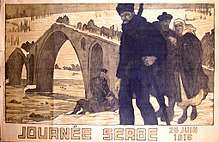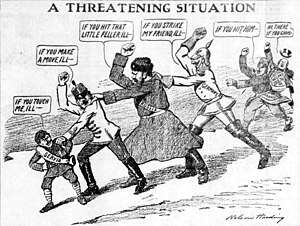Serbophilia
A Serbophile (Serbian: Србофил / Srbofil) is a person who has a strong positive predisposition or interest toward the government, culture, history, or people of Serbia. This could include Serbia itself and its history, the Serbian language, Serbian cuisine, literature, etc. The opposite of a Serbophile is a Serbophobe (Serbian: Србофоб / Srbofob) – who has a strong negative predisposition toward or dislike of the government, culture, history or people of Serbia.

French poster from WWI
Serbophiles
- Johann Wolfgang von Goethe — famous German writer, poet, scientist, artist and politician.[1]
- Jacob Grimm — German philologist, jurist and mythologist. Learnt Serbian in order to read Serbian epic poetry.[2][3]
- Archibald Reiss — German-Swiss publicist, chemist, forensic scientist, a professor at the University of Lausanne.[4]
- Victor Hugo — French poet, novelist, and dramatist of the Romantic movement.[5] Hugo wrote the speech Pour la Serbie.
- Several notable composers used motifs from Serbian folk music and composed works inspired by Serbian history or culture, such as: Johannes Brahms, Franz Liszt, Arthur Rubinstein, Antonín Dvořák, Pyotr Ilyich Tchaikovsky, Nikolai Rimsky-Korsakov, Franz Schubert, Hans Huber and other.[6]
- Rebecca West (1892–1983) — British travel writer. Was described by American media as having a pro-Serbian stance.[7]
- Flora Sandes — British Irish volunteer in World War I.
- Ruth Mitchell — American volunteer in the Chetniks, World War II. Sister of Billy Mitchell.
- Peter Handke — Austrian novelist and playwright, Nobel Prize winner. Supported Serbia in the Yugoslav Wars.[8]
- Eduard Limonov — Russian writer and poet.[9]
- Essad Pasha Toptani — Ottoman Albanian politician.[10]
- Henry Bax-Ironside — British diplomat.[11]
- Herbert Vivian — British journalist and author of Servia: The Poor Man's Paradise and The Servian Tragedy: With Some Impressions of Macedonia.[12]
- Malvina Hoffman — American sculptor and lobbyist for the Serbian cause in WWI.
- Yu Hua — Chinese author[13]
Gallery
 "A Threatening Situation", a comic published in the American newspaper the Brooklyn Eagle in July 1914
"A Threatening Situation", a comic published in the American newspaper the Brooklyn Eagle in July 1914 Departure for Serbia
Departure for Serbia WWI poster - Kosovo Day, June 28, 1916, published in solidarity with the Serb allies
WWI poster - Kosovo Day, June 28, 1916, published in solidarity with the Serb allies WWI poster - Save Serbia (1915)
WWI poster - Save Serbia (1915)
gollark: No, Python types *are themselves* objects which you can do object things too.
gollark: In Python.
gollark: Yes. Types are just objects.
gollark: How are Python's "new types"?
gollark: You can use metatables to create "types" and "objects of these types".
References
- http://www.gmbooks.com/product/SerbMusicGM.html
- Donald Haase (2008). The Greenwood Encyclopedia of Folktales and Fairy Tales: G-P. Greenwood Publishing Group. pp. 531–. ISBN 978-0-313-33443-6.
- Selvelli, Giustina. "The Cultural Collaboration between Jacob Grimm and Vuk Karadžić. A fruitful Friendship Connecting Western Europe to the Balkans". Cite journal requires
|journal=(help) - http://www.skss.ch/index.php?option=com_content&view=article&id=107:pouke-arcibalda-rajsa&catid=50:ch-sr&lang=de
- "Les Misérables author Victor Hugo: Champion of Serbs « Britić". Retrieved 25 January 2020.
- Tomić, Dejan (2019). Srbi i evropski kompozitori: srpska muzika i Srbi u delima evropskih kompozitora, od XIX do početka XXI veka. Novi Sad: RTS. ISBN 978-86-6195-173-2, 978-86-81086-31-5
- Victoria Glendinning (1988). Rebecca West: A Life. Fawcett Columbine. p. 176. ISBN 978-0-449-90320-9.
- K. Stuart Parkes (January 2009). Writers and Politics in Germany, 1945-2008. Camden House. pp. 174–. ISBN 978-1-57113-401-1.
- "LIMONOV Junak našeg doba". Печат - Лист слободне Србије (in Serbian). Retrieved 8 April 2019.
- The Ottman Empire and Its Successors, 1801 -1927. CUP Archive. pp. 529–. GGKEY:5L37WGKCT4N.
- Hidryma Meletōn Chersonēsou tou Haimou. Hidryma Meletōn Chersonēsou tou Haimou. 1971.
- Bled, Jean-Paul; Terzić, Slavenko (2001). Europe and the Eastern Question (1878-1923): Political and Organizational Changes. Istorijski institut SANU. pp. 324–325. ISBN 978-86-7743-023-8.
- Serbia, RTS, Radio televizija Srbije, Radio Television of. "Ју Хуа за РТС: Волим Србију, долазим чим прође пандемија". www.rts.rs. Retrieved 28 April 2020.
Sources
- Sells, David (1997). Serb 'Demons' Strike Back (Royal Institute of International Affairs) Vol. 53, No. 2
This article is issued from Wikipedia. The text is licensed under Creative Commons - Attribution - Sharealike. Additional terms may apply for the media files.